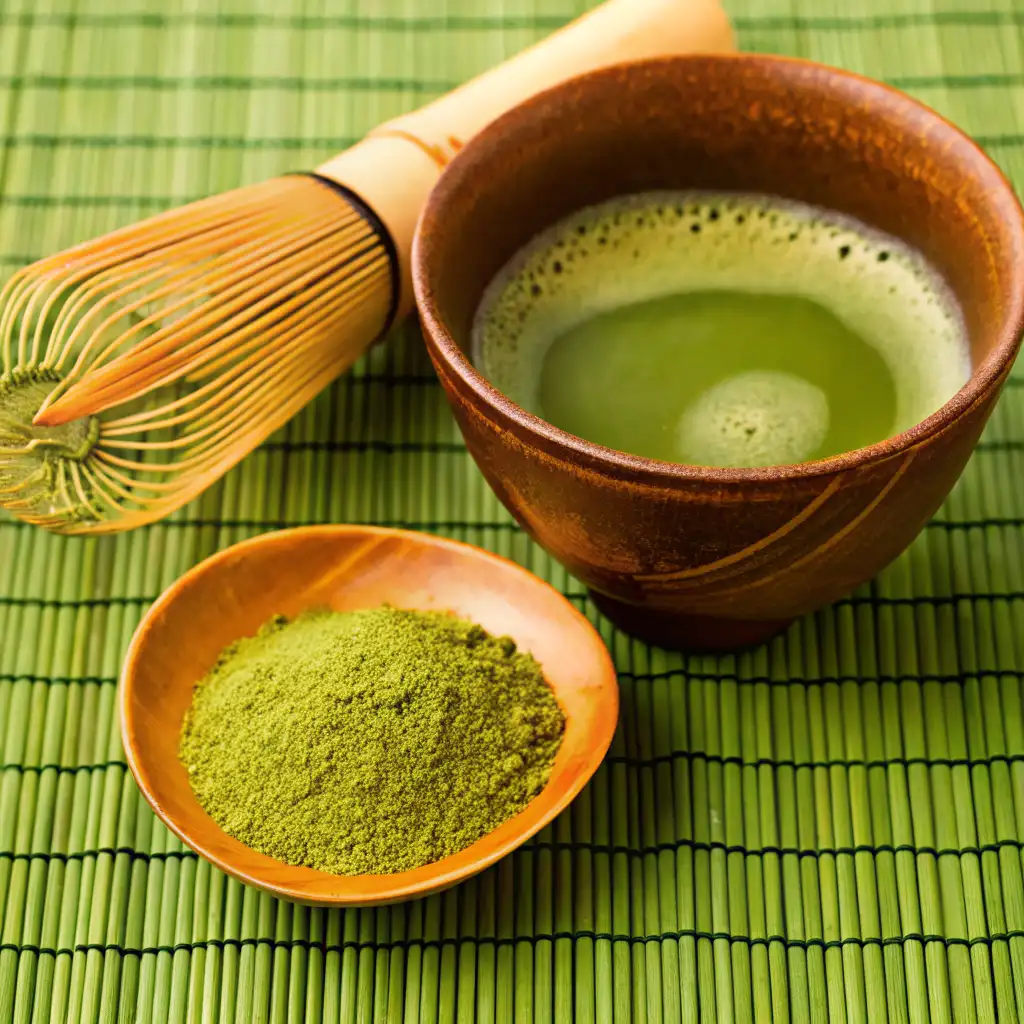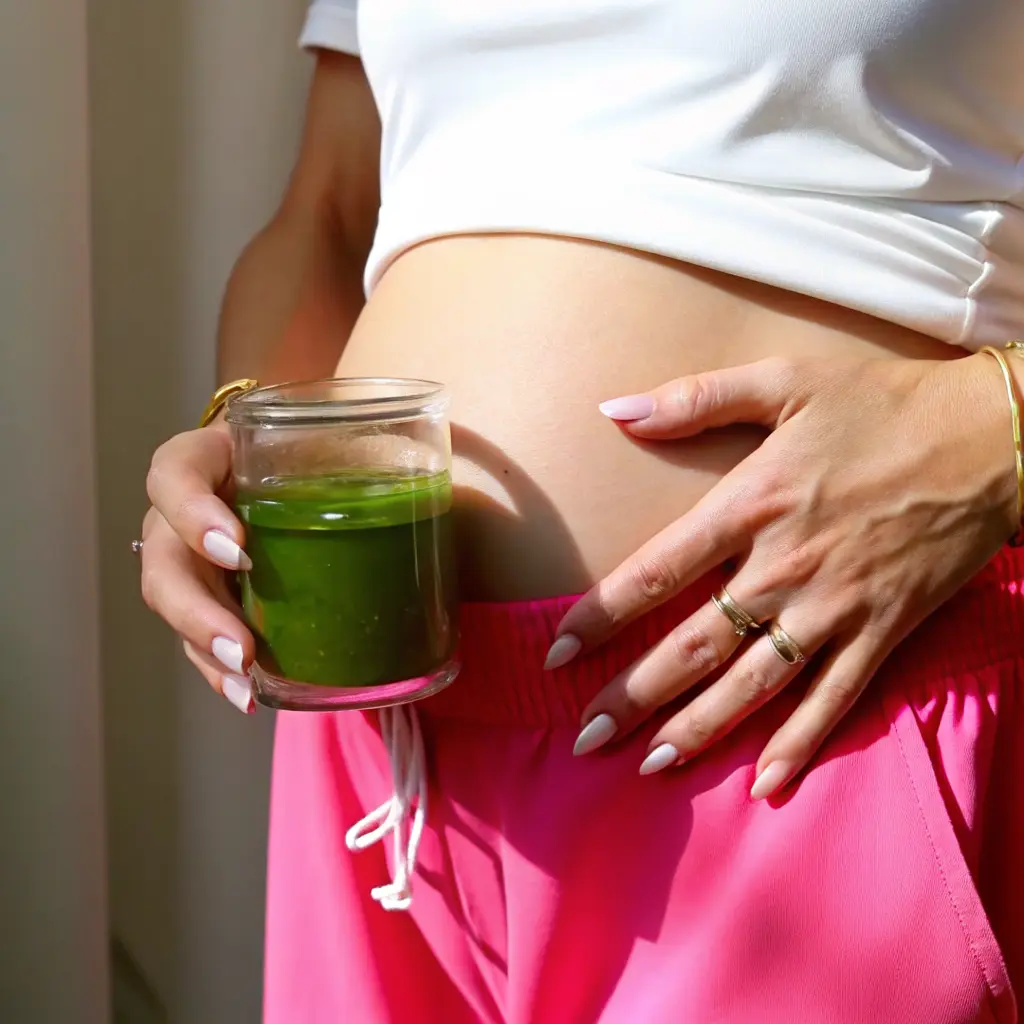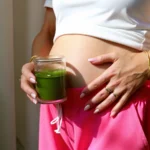Can I drink matcha while pregnant? It’s a question that comes up often among expecting moms who love their daily green cup. Matcha, with its vibrant color and calming energy boost, has become a favorite for many—but is it safe during pregnancy?
Let’s explore what matcha really is, the role of caffeine during pregnancy, and how you can safely enjoy it if you’re expecting. Whether you’re curious, cautious, or just looking for a better option than coffee, this guide offers clarity with facts, expert advice, and a personal touch from Emily’s own story.
Looking for healthy sips? Don’t miss our antioxidant-rich butterfly pea flower tea and calming pine needle tea—perfect for pregnancy-safe hydration.
Table of Contents
What Is Matcha
Matcha is a finely ground powder made from specially grown and processed green tea leaves, traditionally used in Japanese tea ceremonies. Unlike steeped green tea, matcha contains the whole leaf, giving it a higher concentration of nutrients and caffeine.
Because you’re consuming the entire leaf, matcha provides a stronger antioxidant punch, more chlorophyll, and a smooth, sustained energy boost compared to regular tea.
Is Matcha Safe During Pregnancy?
So, can I drink matcha while pregnant without worrying about my baby’s health?
When it comes to matcha and pregnancy, the key word is moderation
Matcha is generally considered safe in small amounts during pregnancy. However, it does contain caffeine, and that’s where concerns arise. The American College of Obstetricians and Gynecologists recommends limiting caffeine intake during pregnancy to 200 mg per day.
Since matcha contains both caffeine and a high antioxidant load, pregnant individuals need to consider both the quantity and quality of what they consume.
PrintCan I Drink Matcha While Pregnant? What You Need to Know
Wondering if matcha is safe during pregnancy? This guide explains everything—from caffeine content to safe servings, benefits, risks, and expert advice—plus Emily’s personal story of sipping matcha in her third trimester.
- Prep Time: 5 minutes
- Cook Time: 0 minutes
- Total Time: 5 minutes
- Yield: 1 serving 1x
- Category: Healthy Drink
- Method: No Cook
- Cuisine: Japanese
Ingredients
- 1/2–1 teaspoon of ceremonial-grade matcha powder
- Hot (not boiling) water or warm milk
- Optional: oat milk, honey, or smoothie ingredients
- Organic matcha from reputable sources
Instructions
- Measure 1/2–1 teaspoon of matcha powder into a bowl or cup.
- Add a small amount of hot (not boiling) water to whisk and dissolve matcha into a smooth paste.
- Fill with more warm water or milk of choice (like oat milk).
- Sweeten with honey if desired.
- Enjoy matcha between meals, away from prenatal vitamins.
- Limit intake to avoid exceeding 200 mg of caffeine per day.
- Consult your doctor if unsure or if you have high-risk factors.
Notes
Opt for ceremonial-grade matcha to reduce risk of heavy metals and ensure higher quality. Matcha may interfere with folic acid absorption, so take prenatal vitamins separately.
Nutrition
- Serving Size: 1 cup
- Calories: 25
- Sugar: 1g
- Sodium: 5mg
- Fat: 0g
- Saturated Fat: 0g
- Unsaturated Fat: 0g
- Trans Fat: 0g
- Carbohydrates: 2g
- Fiber: 0g
- Protein: 1g
- Cholesterol: 0mg
How Much Caffeine Is in Matcha?
Many women wondering, “can I drink matcha while pregnant?” are concerned about how it compares to coffee.
A typical serving of matcha (1 gram of powder or about ½ teaspoon) contains around 35–70 mg of caffeine, depending on grade and preparation.
Let’s compare:
| Beverage | Avg. Caffeine per Serving |
|---|---|
| Coffee (8 oz) | 95–200 mg |
| Matcha (1 tsp) | 70 mg |
| Green Tea (8 oz) | 25–45 mg |
| Black Tea (8 oz) | 47–90 mg |
During pregnancy, your body metabolizes caffeine slower, meaning it stays in your system longer. High caffeine intake may affect fetal development and sleep patterns in later trimesters.
So, if you’re drinking matcha, keep servings small and spaced out—or try half a teaspoon in lattes or smoothies to stay within safe limits.

Benefits of Drinking Matcha While Pregnant (In Moderation)
1. A Gentle Energy Boost
Unlike the jolt from coffee, matcha offers steady, calm energy thanks to L-theanine—a compound that promotes relaxation without drowsiness.
2. Rich in Antioxidants
Matcha is loaded with EGCG, a catechin known for its antioxidant power. These compounds help fight inflammation and support the immune system—something especially helpful during pregnancy.
3. Mental Clarity and Focus
Pregnancy brain is real. Many moms turn to matcha for its reputation in supporting alertness and memory, without the harsh caffeine spike.
Looking for a natural metabolism boost while staying balanced? Try our Brazilian Mounjaro weight loss recipe for a gentle, whole-food approach.
Potential Risks of Matcha During Pregnancy
1. Caffeine Sensitivity
Even low amounts of caffeine can lead to restlessness, heartburn, or insomnia, especially during the third trimester.
2. Folic Acid Absorption
Some studies suggest green tea (and matcha) may slightly interfere with folic acid absorption—especially when consumed in large amounts. Since folate is critical for neural tube development, it’s wise to avoid matcha around the time you take prenatal vitamins.
3. Heavy Metals
Like all teas, matcha can sometimes contain trace heavy metals depending on the soil it was grown in. Always choose organic, high-quality ceremonial-grade matcha from reputable sources to avoid contamination.
How to Enjoy Matcha Safely While Pregnant
- ✅ Limit to ½–1 teaspoon per day
- ✅ Avoid matcha on an empty stomach
- ✅ Space it away from prenatal vitamin time
- ✅ Stick to ceremonial or organic matcha brands
- ✅ Use food-based pairings like matcha oatmeal or matcha banana bread
- ✅ Talk to your doctor, especially if you’re sensitive to caffeine or have high-risk factors
Emily’s Story: A Calmer Cup During Her Third Trimester
Emily, a mom of two and matcha enthusiast, made the switch from her usual 2-coffee routine to matcha during her third trimester. Her goal? To feel more energized without the jitters.
“I started sipping matcha lattes made with oat milk and a drizzle of honey,” she says. “It became a daily ritual—something warm and comforting that didn’t upset my stomach or mess with my sleep.”
Emily credits her matcha routine with helping her feel more in control, especially during the slower, heavier days leading up to delivery.
Want to feel good sipping something green and wholesome? Explore our naturally soothing pine needle tea for another caffeine-free option.
FAQs About Matcha and Pregnancy
Is matcha tea ok during pregnancy?
Yes, in moderation. Limit intake to about ½–1 tsp per day (roughly 35–70 mg caffeine), and consult your doctor if unsure.
What teas should I avoid while pregnant?
Avoid teas with high caffeine (like black tea in excess), detox teas, and those with herbs not proven safe in pregnancy (like licorice root, sage, or rosemary in large amounts).
Does matcha affect folic acid?
Green tea and matcha may reduce folic acid absorption if consumed in large amounts. To be safe, take prenatal vitamins at a different time than your matcha.
How much caffeine is in a matcha latte?
Depending on how much matcha powder is used, a latte may contain **40–80 mg of caffeine**. Always ask for half portions during pregnancy.
Can matcha cause miscarriage?
There’s no direct link, but excessive caffeine intake (over 300 mg daily) has been associated with increased risk. Keep matcha limited and doctor-approved.
Is decaf matcha a thing?
True decaf matcha doesn’t really exist, but some brands offer lower-caffeine blends or mixed herbal matcha drinks. Look for “low caffeine” on the label.
Final Thoughts on Matcha for Expecting Moms
Can you drink matcha while pregnant? Yes—with care and mindfulness. While matcha can be part of a healthy prenatal routine, it’s all about moderation, quality, and timing. Pay attention to how your body feels, talk to your doctor, and enjoy the calm energy that matcha offers.
Whether you’re replacing coffee or simply savoring something green and grounding, matcha might just become your new favorite sip during pregnancy and beyond.
In short, if you’ve been wondering, “can I drink matcha while pregnant”, the answer is yes—when enjoyed in moderation and with care.


